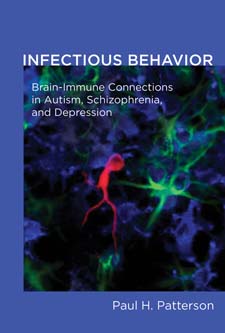In Infectious Behaviour, neurobiologist Paul Patterson examines the involvement of the immune system in autism, schizophrenia, and major depressive disorder. Although genetic approaches to these diseases have garnered the lion’s share of publicity and funding, scientists are uncovering evidence of the important avenues of communication between the brain and the immune system and their involvement in mental illness. Patterson focuses on this brain-immune crosstalk, exploring the possibility that it may help us understand the causes of these common but still mysterious diseases. The heart of this engaging book, accessible to non-scientists, concerns the involvement of the immune systems of the pregnant woman and her fetus, and a consideration of maternal infection as a risk factor for schizophrenia and autism. Patterson reports on research that may shed light on today’s autism epidemic. He also outlines the risks and benefits of both maternal and postnatal vaccinations.
In the course of his discussion, Patterson offers a short history of immune manipulation in treating mental illness (recounting some frightening but fascinating early experiments) and explains how the immune system influences behaviour and how the brain regulates the immune system, looking in particular at stress and depression. He examines the prenatal origins of adult disease and evidence for immune involvement in autism, schizophrenia, and depression. Finally, he describes the promise shown by recent animal experiments that have led to early clinical trials of postnatal and adult treatments for patients with autism and related disorders.
Author Bio:
Paul H. Patterson, a developmental neurobiologist, is Anne P. and Benjamin R. Biaggini Professor of Biological Sciences at the California Institute of Technology and a Research Professor of Neurological Surgery at the University of Southern California’s Keck School of Medicine. He is the co-author (with Alan Brown) of The Origins of Schizophrenia.





